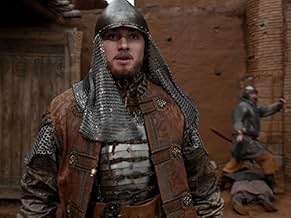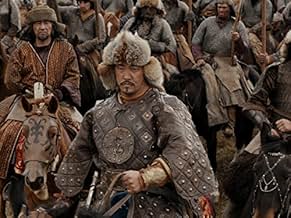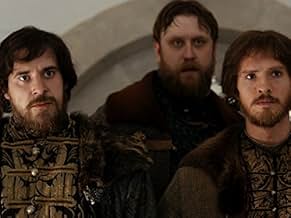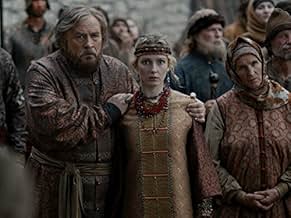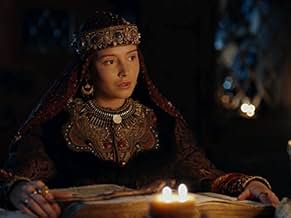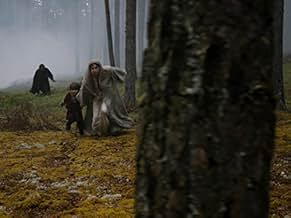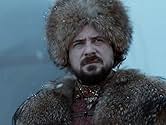In 15th-century Russia, Byzantine princess Sophia Palaiologina weds Czar Ivan III. Overcoming intrigues, she aids Ivan in unifying Russia, expelling Mongol invaders, and constructing the ico... Read allIn 15th-century Russia, Byzantine princess Sophia Palaiologina weds Czar Ivan III. Overcoming intrigues, she aids Ivan in unifying Russia, expelling Mongol invaders, and constructing the iconic Kremlin.In 15th-century Russia, Byzantine princess Sophia Palaiologina weds Czar Ivan III. Overcoming intrigues, she aids Ivan in unifying Russia, expelling Mongol invaders, and constructing the iconic Kremlin.
- Awards
- 4 wins & 10 nominations total
Browse episodes
Featured reviews
Russian historical series related to Zoe-Sophia Palaiologina, niece of the last Byzantine Emperor Constantine XI, Palaiologos, and later Grand Princess of Moscow. She was the grandmother of Ivan IV, the Terrible.
The series is well directed and shut and the acting very good. It is recommended to those who are going to see it and do not know who Zoe-Sophia Palaiologina was, to have a look in a history book, or just in Wikipedia, in order to have a basic idea for her and the history they are going to see.
My vote 10/10.
The series is well directed and shut and the acting very good. It is recommended to those who are going to see it and do not know who Zoe-Sophia Palaiologina was, to have a look in a history book, or just in Wikipedia, in order to have a basic idea for her and the history they are going to see.
My vote 10/10.
I love period drama and the Russians always do a wonderful job, even if at its heart is a political statement. Strong female characters, strong male characters, strong story. The only thing I find myself missing is a 2nd season
The Russian TV miniseries Sofiya (2016) was shown in the U.S. with the anglicised title Sophia. The series was directed by Vyacheslav Ross and Aleksey Andrianov. Mariya Andreeva is superb in the title role of Sophia Palaiologina, who was a Byzantine princess.
By the time the movie begins--in the late 15th century--Constantinople had been conquered by the Turks. Sophia and her family had escaped to Rome, where they were treated well by the Pope and a cardinal.
Her marriage was arranged with Ivan III, Prince of Muscovy. It was thought that her influence would be enough to lead Russia, which was Eastern Orthodox, back to Roman Catholicism. We learn immediately that four years in Rome had not permanently changed Sophia's belief in Eastern Orthodoxy. Once she crossed into Russia, she returned to her original faith.
One plot of the movie is agents of the Pope trying to kill Sophia. Another is the castle intrigues, heresies, and political infighting. (We call such matters Byzantine for a reason, but they were not restricted to the Byzantine Empire.)
We heard a lecture about the historical Sophia, and as far as I can tell, the plot of the miniseries is historically accurate in the overall sense. Whether the dialog actually played out in real life the way it did on the screen is beyond my knowledge.
Incidentally, the lecturer called the movie a soap opera. Well, yes and no. Most miniseries could be called soap operas if you think of them that way. Episode one--crisis, then resolution, then a teaser. Episode two--crisis, then resolution, then a teaser. Downton Abbey was a soap opera too, if that's how you define soap opera.
My thought is that this is a miniseries about a fascinating episode in Russian history, well acted and well directed. Other raters agreed with me, because Sophia has a very high IMDb rating of 7.8. I thought it was even better than that, and rated it 9.
By the time the movie begins--in the late 15th century--Constantinople had been conquered by the Turks. Sophia and her family had escaped to Rome, where they were treated well by the Pope and a cardinal.
Her marriage was arranged with Ivan III, Prince of Muscovy. It was thought that her influence would be enough to lead Russia, which was Eastern Orthodox, back to Roman Catholicism. We learn immediately that four years in Rome had not permanently changed Sophia's belief in Eastern Orthodoxy. Once she crossed into Russia, she returned to her original faith.
One plot of the movie is agents of the Pope trying to kill Sophia. Another is the castle intrigues, heresies, and political infighting. (We call such matters Byzantine for a reason, but they were not restricted to the Byzantine Empire.)
We heard a lecture about the historical Sophia, and as far as I can tell, the plot of the miniseries is historically accurate in the overall sense. Whether the dialog actually played out in real life the way it did on the screen is beyond my knowledge.
Incidentally, the lecturer called the movie a soap opera. Well, yes and no. Most miniseries could be called soap operas if you think of them that way. Episode one--crisis, then resolution, then a teaser. Episode two--crisis, then resolution, then a teaser. Downton Abbey was a soap opera too, if that's how you define soap opera.
My thought is that this is a miniseries about a fascinating episode in Russian history, well acted and well directed. Other raters agreed with me, because Sophia has a very high IMDb rating of 7.8. I thought it was even better than that, and rated it 9.
This series is not only absolutely gorgeous and fascinating to look at (not just the costumes, but ALL of the sets and even the make-up -- or the authentic-looking lack thereof) but extraordinarily entertaining, intelligently produced, and beautifully acted. Neither American nor British television (including the BBC) has EVER produced anything half this good.
I don't care about historical accuracy (and I disagree with reviewers who say you need to research the history in order to enjoy this series), but I care very much about historical believability, and there is not a single frame or word or movement that feels like anything but 15th century Russia.
There is much thoroughly believable drama, but not ANY melodrama, which is what sets it miles apart from American and even British productions. It's like a time machine, letting me watch these people living their lives as they really lived them more than 500 years ago. It seems so real and so true that I'm amazed when I remember occasionally that these are 21st-century actors only pretending to be historical persons.
I don't care about historical accuracy (and I disagree with reviewers who say you need to research the history in order to enjoy this series), but I care very much about historical believability, and there is not a single frame or word or movement that feels like anything but 15th century Russia.
There is much thoroughly believable drama, but not ANY melodrama, which is what sets it miles apart from American and even British productions. It's like a time machine, letting me watch these people living their lives as they really lived them more than 500 years ago. It seems so real and so true that I'm amazed when I remember occasionally that these are 21st-century actors only pretending to be historical persons.
This series is really great and I really enjoyed it but it is much more about ivan iii and his mother with a little bit thrown in about Sofia
- How many seasons does Sophia have?Powered by Alexa
Details
- Release date
- Country of origin
- Official site
- Language
- Also known as
- Sophia
- Production companies
- See more company credits at IMDbPro
- Runtime52 minutes
- Color
Contribute to this page
Suggest an edit or add missing content



